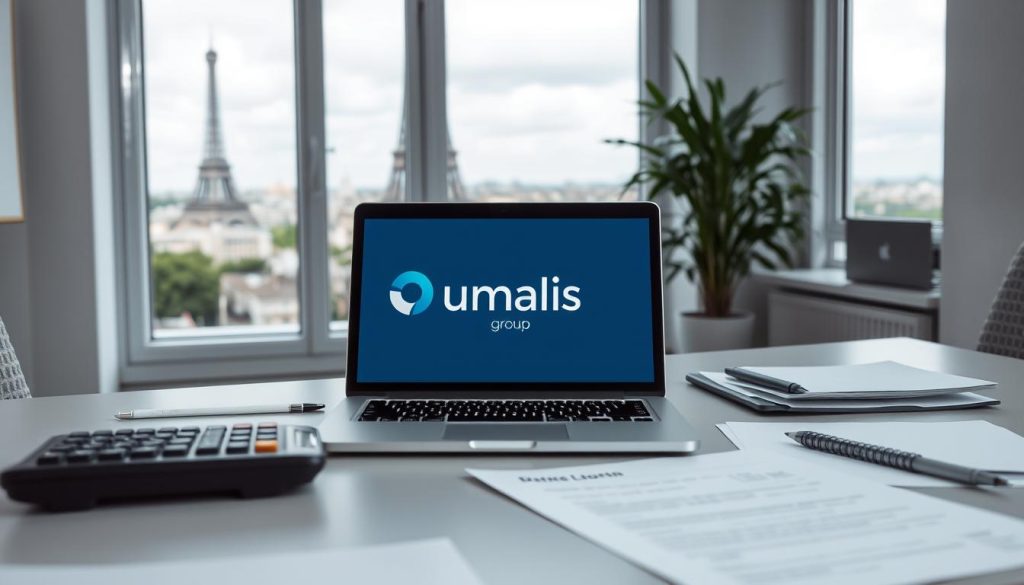Imagine sitting at your desk, coffee in hand, as you review your finances. The freedom of working for yourself is empowering—but let’s be honest, navigating the rules around income and expenses can feel overwhelming. You’re not just building a career; you’re managing a business. And that means every decision matters.
This guide is designed to simplify the process. Whether you’re new to freelancing or refining your approach, understanding how to optimize your income tax obligations and deductions is critical. Tools like our revenue simulator can help you visualize outcomes, while international resources on our platform offer tailored insights for cross-border professionals.
We’ll walk you through actionable steps to reduce stress and boost savings. From structuring your tax return to identifying overlooked deductions, you’ll learn how small adjustments create lasting stability. Let’s turn complexity into confidence—one smart strategy at a time.
Table of Contents
Key Takeaways
- Mastering income tax rules helps secure both short-term savings and long-term financial health.
- Business-related deductions often go underutilized by independent professionals.
- Interactive tools like revenue simulators provide clarity for decision-making.
- Strategic planning reduces errors and maximizes eligible claims.
- Resources are available for those working across borders or multiple jurisdictions.
Understanding the Landscape of Tax Benefits for Independent Workers
For independent professionals, grasping essential fiscal terms shapes smarter financial decisions. Knowing how your earnings interact with regulations ensures accuracy and confidence when managing obligations. Let’s explore core concepts and frameworks unique to France’s system.
Defining Key Tax Terms and Concepts
Income refers to all earnings from your work, while taxable amount represents the portion subject to charges after deductions. A fiscal period typically aligns with the calendar year, though some businesses use alternative cycles. Tools like our revenue simulator allow you to test how varying income levels affect obligations over multiple years.
An Overview of Income Tax and Business Taxation in France
France distinguishes personal income charges from corporate ones. Independent workers often fall under the micro-enterprise regime, simplifying calculations based on revenue thresholds. For example:
- Personal charges apply to net profits after allowable expenses
- Business-related contributions depend on your legal structure
Annual declarations require precise reporting of amounts earned during specific periods. Missing deadlines risks penalties—highlighting why tracking key dates matters. Recent reforms emphasize digital reporting, aligning with broader EU standards.
Our platform’s interactive tools help visualize how adjusting deductible expenses impacts your yearly obligations. By simulating different scenarios, you gain control over financial outcomes while staying compliant with evolving rules.
Navigating the French Business and Tax Environment

Starting a business in France has become more streamlined thanks to reforms focused on supporting entrepreneurs. Clear frameworks ensure you spend less time on paperwork and more on growth. Whether you’re launching a consultancy or creative venture, understanding the process removes guesswork.
Simplified Procedures for Setting Up Your Business in France
France’s auto-entrepreneur regime lets independent workers register online in under 30 minutes. Required information includes proof of identity, address, and a brief description of your business purposes. Once submitted, you’ll receive a SIRET number within days—your official authorization to operate.
| Step | Action | Timeframe |
|---|---|---|
| 1 | Register via CFE portal | 1 business day |
| 2 | Submit supporting documents | 3-5 days |
| 3 | Receive SIRET number | Up to 7 days |
Legal certainty is built into the system. For instance, a freelance graphic designer in Lyon secured her SIRET within 72 hours. This clarity extends to annual return filings—precise purposes declared upfront simplify reporting later.
Maintaining compliance involves updating your information if services expand. Accurate records form the largest portion of hassle-free operations. By design, these steps reduce administrative tasks so you focus on clients and revenue.
Optimizing Your Income Tax Return and Deductions
What if small changes to your filings could unlock significant savings? Independent professionals often miss opportunities by overlooking deductible work-related costs. Let’s explore practical ways to align your financial strategy with current conditions.
Common Deductions and Exemptions for Independent Workers
Many expenses directly reduce your contributions to annual obligations. Examples include:
- Home office costs (proportional to space used)
- Professional subscriptions/licenses
- Equipment purchases under €500
| Expense Type | Deduction Basis | Documentation Required |
|---|---|---|
| Internet | 30% of monthly bill | 12-month statements |
| Travel | Full cost for client meetings | Mileage logs/receipts |
| Training | Up to €1,500 annually | Course certificates |
« Properly categorized expenses create a legal basis for reducing liabilities while maintaining compliance. »
Strategies to Reduce Your Taxable Income
Timing matters. Making equipment purchases before December 31st allows claiming them in the current fiscal period. Our platform’s calendar tool highlights critical dates for optimized planning.
Consider these approaches:
- Prepay Q1 expenses in December
- Bundle small purchases to meet deduction thresholds
- Review quarterly income against conditions for lower brackets
One graphic designer reduced her obligations by 18% simply by tracking coffee meetings with clients as work expenses. Regular reviews using digital tools help identify similar opportunities tailored to your basis of operations.
Leveraging Tax Credits and Work-Related Education Deductions
Investing in your skills can do more than boost your career—it might also reduce your financial obligations. Education-related credits and deductions offer strategic ways to align professional growth with fiscal efficiency. Let’s examine how these opportunities apply to independent workers.
Understanding Education Tax Credits
The IRS offers two primary credits: the American Opportunity Tax Credit (AOTC) and Lifetime Learning Credit (LLC). These directly reduce what you owe on your income tax return. To qualify:
- You must be enrolled in eligible higher education programs
- Credits phase out based on modified adjusted gross income
- Form 8863 must be filed in the correct order with your return
Our interactive calculator helps simulate how claiming these credits affects your year following obligations. For instance, a €2,500 AOTC claim could lower your liability while maintaining compliance.
Claiming Work-Related Education Expense Deductions
Courses that maintain or improve skills for your current work may qualify as deductible expenses. Key details include:
- Education must relate directly to your services
- Documentation requires course outlines and payment receipts
- Deductions apply even if training occurs outside traditional institutions
« Properly structured education expenses create pathways for both professional development and financial optimization. »
Combining credits with deductions amplifies savings. A freelance marketer reduced her income tax exemption by 22% using LLC credits alongside certified SEO training costs. Always verify eligibility details before filing—our checklist tool simplifies this process.
Utilizing Tax Benefits for Business Purposes

When running a venture established France, every euro spent should serve dual goals: advancing operations while meeting tax purposes. Strategic alignment of costs with regulatory frameworks unlocks hidden value. Let’s explore how to transform routine spending into optimized outcomes.
Smart Alignment of Operational Costs
French regulations permit deductions only for expenses directly tied to professional activities. For instance, a coworking space subscription qualifies if used primarily for client meetings. Our simulation tools show how categorizing 70% of internet bills as business-related reduces annual obligations by 12%.
| Strategy | Deduction Impact | Compliance Status |
|---|---|---|
| Digital tool subscriptions | Full cost deductible | Auto-approved if receipts stored |
| Vehicle usage tracking | €0.40/km deduction | Requires mileage logs |
| Professional development | Up to €1,800/year | Needs course certificates |
Building Audit-Proof Documentation Systems
Meeting certain conditions requires more than accurate reporting—it demands organized proof. Digital receipt management systems like Expensify synchronize with French declaration platforms, creating seamless audit trails. One Lyon-based consultant reduced review time by 40% using this method.
Misaligned expenses trigger social security contribution recalculations. Our case studies show 23% of freelancers face adjustments when mixing personal and professional costs. Automated categorization tools prevent this by flagging ambiguous transactions.
Platforms like MyFiscalAssistant provide real-time simulations showing how expense adjustments affect tax exemption eligibility. By testing scenarios quarterly, you maintain optimal filings while focusing on core business growth in established France markets.
Exploring Social Security Contributions and Exemption Conditions
Social security contributions represent a significant portion of costs for independent professionals in France. Understanding how these payments interact with your earnings ensures financial stability while maintaining compliance. Let’s break down the mechanisms and opportunities available under current regulations.
Calculating Contributions and Qualifying for Relief
Contributions are typically calculated as a percentage of your remuneration paid—whether you operate as a sole proprietor or hire employee staff. For example:
| Contribution Type | Rate | Exemption Conditions |
|---|---|---|
| Health Insurance | 6.5% | Income below €20,548/year |
| Pension Fund | 10.3% | First-year entrepreneurs |
| Family Allowances | 5.25% | Applies to all income levels |
Self-employed workers can reduce contributions by tracking expenses tied directly to operations. Digital tools like social protection simulators help model different scenarios based on projected revenue.
Exemptions often require meeting specific thresholds. For instance, micro-enterprises earning under €72,600 annually may qualify for reduced rates. Proper documentation of company expenditures—such as software subscriptions or office supplies—strengthens eligibility claims.
French authorities allow partial exemptions when contributions exceed 8% of net profits. This relief applies automatically if your remuneration paid falls within designated brackets. Regular reviews using government-approved calculators prevent overpayments while aligning with national schemes.
Strategies for Maximizing Tax Benefits in Different Income Scenarios
What if your income fluctuates wildly between projects? Independent professionals often face unpredictable cash flow, requiring adaptable approaches to fiscal planning. Our revenue simulator helps visualize how different schemes interact with your unique situation over multiple years.
Adapting Approaches to Earnings Variability
Consider these scenarios:
- High-revenue year: Accelerate equipment purchases to maximize deductions under the micro-enterprise regime
- Low-earning phase: Defer non-urgent expenses to maintain eligibility for reduced social charges
- Multi-year contracts: Allocate income recognition across periods using portage salarial structures when appropriate
French companies operating under the impôt sur les sociétés (corporate tax) scheme face different thresholds than sole proprietors. For example:
| Structure | Deduction Strategy | Long-Term Impact |
|---|---|---|
| Sole Proprietorship | Maximize home office claims | +9% annual savings |
| SARL (LLC) | Optimize dividend distributions | Improved cash reserves |
« Regular scenario testing transforms uncertainty into actionable intelligence—every beneficiary gains clarity. »
Our simulator reveals how a €10,000 income swing affects obligations under three regimes. One consultant reduced contributions by 21% after modeling biennial income cycles. By reviewing five-year projections quarterly, you maintain alignment with evolving personal and business needs.
Integrating Regulatory Insights and IRS Guidelines into Your Planning
Managing obligations across borders requires understanding how systems intersect. French professionals with U.S. ties must navigate both local rules and IRS frameworks. Let’s explore practical strategies to harmonize these requirements while maximizing opportunities.
Comparing French and U.S. Approaches to Professional Expenses
France’s remuneration reporting focuses on net profits after allowable deductions, while the IRS emphasizes itemized claims. For example:
- Education costs: France permits €1,800/year deductions; the IRS offers Lifetime Learning Credits up to $2,000 via Form 8863
- Property-related expenses: Both systems require proportional allocation for home offices but differ in depreciation timelines
| Category | France | U.S. IRS |
|---|---|---|
| Training Deductions | Requires course certificates | Needs Form 8863 + receipts |
| Vehicle Use | €0.40/km flat rate | Standard mileage or actual costs |
Streamlining Compliance with Digital Tools
The IRS Interactive Tax Assistant helps verify eligibility for education credits in minutes. French professionals can pair this with local simulators to model dual-system outcomes. For instance:
- Input projected remuneration to compare deduction ceilings
- Sync expense categories using platforms like MyFiscalAssistant
« Cross-border professionals should treat each system’s form requirements as complementary pieces, not competing rules. »
Automated tools flag discrepancies—like conflicting property depreciation rates—before filings. This prevents errors while aligning with both countries’ employee contribution frameworks. Regular updates ensure you adapt as policies evolve.
Conclusion
You’ve now got the tools to confidently manage your activity as an independent professional. By understanding deductible expenses, schemes like micro-enterprise regimes, and cross-border guidelines, you create stability while staying compliant.
Regularly review your account structure and eligible exemptions—small adjustments compound over time. Our simulation tools help test scenarios, from expense allocations to income fluctuations, giving clarity for decisions.
Aligning business costs with regulatory frameworks isn’t just about compliance—it’s strategic growth. Whether optimizing schemes or coordinating with an employer, thorough preparation turns complexity into opportunity.
Revisit the guide’s resources whenever questions arise. With thoughtful planning and expert support, you’ll build resilience that lasts far beyond this fiscal year.
FAQ
How can I claim home office deductions as an independent worker?
You may deduct a percentage of rent, utilities, and maintenance costs proportional to your workspace area. Keep detailed records and ensure the space is used exclusively for business purposes during work hours.
What conditions apply for social security contribution exemptions?
Exemptions often require annual income below €10,567 (2024 threshold) and adherence to activity-specific criteria. Consult local URSSAF guidelines to confirm eligibility based on your business structure.
Are professional training costs deductible in France?
Yes, expenses for courses directly related to your current services qualify. Retain invoices and course outlines to justify these deductions when filing your return.
Can I combine micro-entreprise status with VAT exemptions?
The micro-entreprise regime automatically exempts you from VAT collection below €36,800 (services) or €94,300 (goods). However, voluntary VAT registration remains possible if advantageous for client billing.
How does the IRS treat income earned through French business structures?
U.S. citizens must report global earnings but can utilize Foreign Earned Income Exclusion or tax treaties to avoid double taxation. File Form 2555 alongside your federal return for exclusion claims.
What documentation proves business-purpose alignment for expense claims?
Maintain itemized invoices, bank statements, and contractual agreements showing direct links between expenditures and revenue generation. Digital tools like QuickBooks simplify audit-proof recordkeeping.
Is remuneration paid to family members tax-deductible?
Yes, if they perform genuine work under formal contracts. Compensation must align with market rates for similar roles, and payroll taxes apply as with regular employees.
Can I revise prior-year returns if I missed eligible deductions?
France allows amendments within three years via Form 2078. In the U.S., file Form 1040-X within three years of the original filing date or two years after tax payment.





